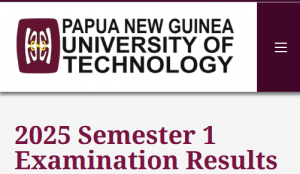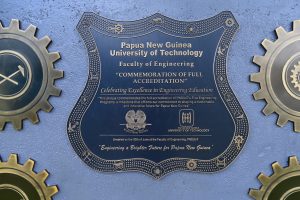About Us
Vision
To be nationally and regionally recognized mechanical engineering department that attracts, reward, and retains outstanding students, academic and support staff.
Mission Statement
Contact Us
PNG University of Technology,
Private Mail Bag, Lae 411, Morobe,
PNG Phone: +(675) 473 4851/4877,
Fax: : +(675) 4734868,
Email: enquiries.mechanical@pnguot.ac.pg
Departmental Advisory Committee
A Departmental Advisory Committee has been operative since 1994. Composed of senior executives and engineers from industry and government departments employing mechanical engineering graduates, and university staff, the Committee meets occasionally to review and upgrade the curriculum, and to deliberate on other matters within the context of the Terms of Reference. It will in particular peruse course details to ensure their relevance to the changing needs of Papua New Guinea and the region.
Facilities
The Department’s laboratories have a large range of teaching, research, and test equipment in the fields of heat engines and vehicle technology, engineering materials science, applied dynamics and machine elements, heat transfer and combustion, refrigeration and air conditioning, flexible manufacturing, metrology, solar energy, fluid power and fluid flow, and non-destructive testing (NDT). In addition there are extensive facilities for teaching workshop technology, and for the manufacture of specialized equipment, including both vertical and horizontal CNC machine centres, and an EDM machine. CAD (computer-aided design) facilities are also available.
Employment
There is a wide range of employment opportunities for mechanical engineering graduates in Papua New Guinea, particularly in the fields of manufacturing, power, mining, agriculture, maintenance of plant and machinery, transport, rural and community development. Activities of graduates include design, supervision of maintenance, planning and supervision of engineering projects, production processes and process control, sales and management.
Research, Development and Services
There are several active research and development projects in the Department, centred on problems of special interest in Papua New Guinea, including the development of low-cost solar heating systems, and solar powered systems for water pumping and space cooling. Other projects include structural vibration analysis, vibration monitoring in machine maintenance, applications to transport and farm machinery, and the development of low-cost water wheels for hydropower.
The staff of the department are willing to offer services to industry in the form of consultancy, personnel training and short courses on selected topics. The areas of involvement may comprise rural development including mechanisation of agricultural production, materials testing, solar energy applications, alternative fuels and renewable energy sources, including charcoal and pyrolytic liquid fuels, wind power, hydro power, production systems including manufacturing processes, plant layout, materials handling, warehouse design and operations, production planning and control, and computer-aided design and drafting.




